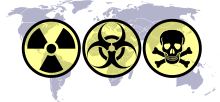
Back فرنسا وأسلحة الدمار الشامل Arabic ফ্রান্স ও গণবিধ্বংসী অস্ত্র Bengali/Bangla Armas de destrucción masiva en Francia Spanish Ranskan joukkotuhoaseet Finnish Armes de destruction massive en France French フランスの大量破壊兵器 Japanese França e as armas de destruição em massa Portuguese Ядерное оружие Франции Russian Ядерна програма Франції Ukrainian 法國與大規模殺傷性武器 Chinese
| France | |
|---|---|
 | |
| Nuclear program start date | 26 December 1954 |
| First nuclear weapon test | February 13, 1960 |
| First thermonuclear weapon test | August 24, 1968 |
| Last nuclear test | January 27, 1996 |
| Largest yield test | 2.6 Mt (August 24, 1968) |
| Total tests | 210 |
| Peak stockpile | 540 (1992) |
| Current stockpile | 290 warheads (2023)[1] |
| Current strategic arsenal | 290 warheads (2024)[2] |
| Cumulative strategic arsenal in megatonnage | ~51.6[3] |
| Maximum missile range | ~8000-10000km/5000-6250mi (M51 SLBM) |
| NPT party | Yes (1992, one of five recognized powers) |
| Nuclear weapons |
|---|
 |
| Background |
| Nuclear-armed states |
|
France is one of the five "Nuclear Weapons States" under the Treaty on the Non-Proliferation of Nuclear Weapons, but is not known to possess or develop any chemical or biological weapons.[4][5] France is the only member of the European Union to possess independent (non-NATO) nuclear weapons. France was the fourth country to test an independently developed nuclear weapon, doing so in 1960 under the government of Charles de Gaulle. The French military is currently thought to retain a weapons stockpile of around 300[6] operational (deployed) nuclear warheads, making it the fourth-largest in the world, speaking in terms of warheads, not megatons.[7] The weapons are part of the country's Force de dissuasion, developed in the late 1950s and 1960s to give France the ability to distance itself from NATO while having a means of nuclear deterrence under sovereign control.
France did not sign the Partial Nuclear Test Ban Treaty, which gave it the option to conduct further nuclear tests until it signed and ratified the Comprehensive Nuclear-Test-Ban Treaty in 1996 and 1998 respectively. France denies currently having chemical weapons, ratified the Chemical Weapons Convention (CWC) in 1995, and acceded to the Biological Weapons Convention (BWC) in 1984. France had also ratified the Geneva Protocol in 1926.
- ^ "Nuclear Notebook: French nuclear weapons, 2023".
- ^ "Nuclear Notebook: French nuclear weapons, 2023".
- ^ "Minimize Harm and Security Risks of Nuclear Energy".
- ^ "CNS - Chemical and Biological Weapons Possession and Programs Past and Present". Federation of American Scientists. Archived from the original on 2001-10-02. Retrieved 2008-03-21.
- ^ "France and the Chemical Weapons Convention". French Ministry of Foreign and European Affairs. Archived from the original on 2008-04-13. Retrieved 2008-03-21.
- ^ "Status of World Nuclear Forces".
- ^ Table of French Nuclear Forces (Natural Resources Defense Council, 2002)
